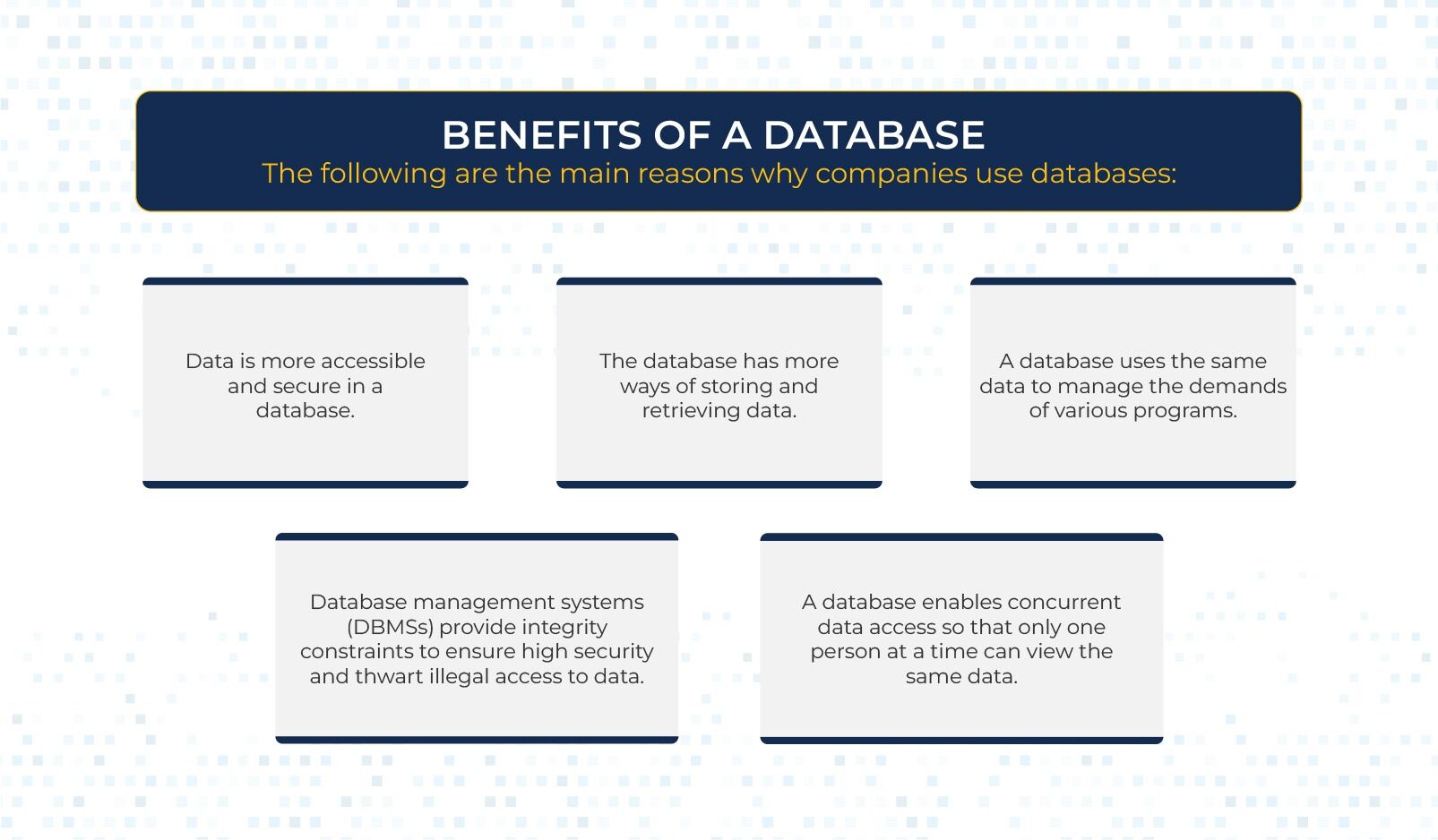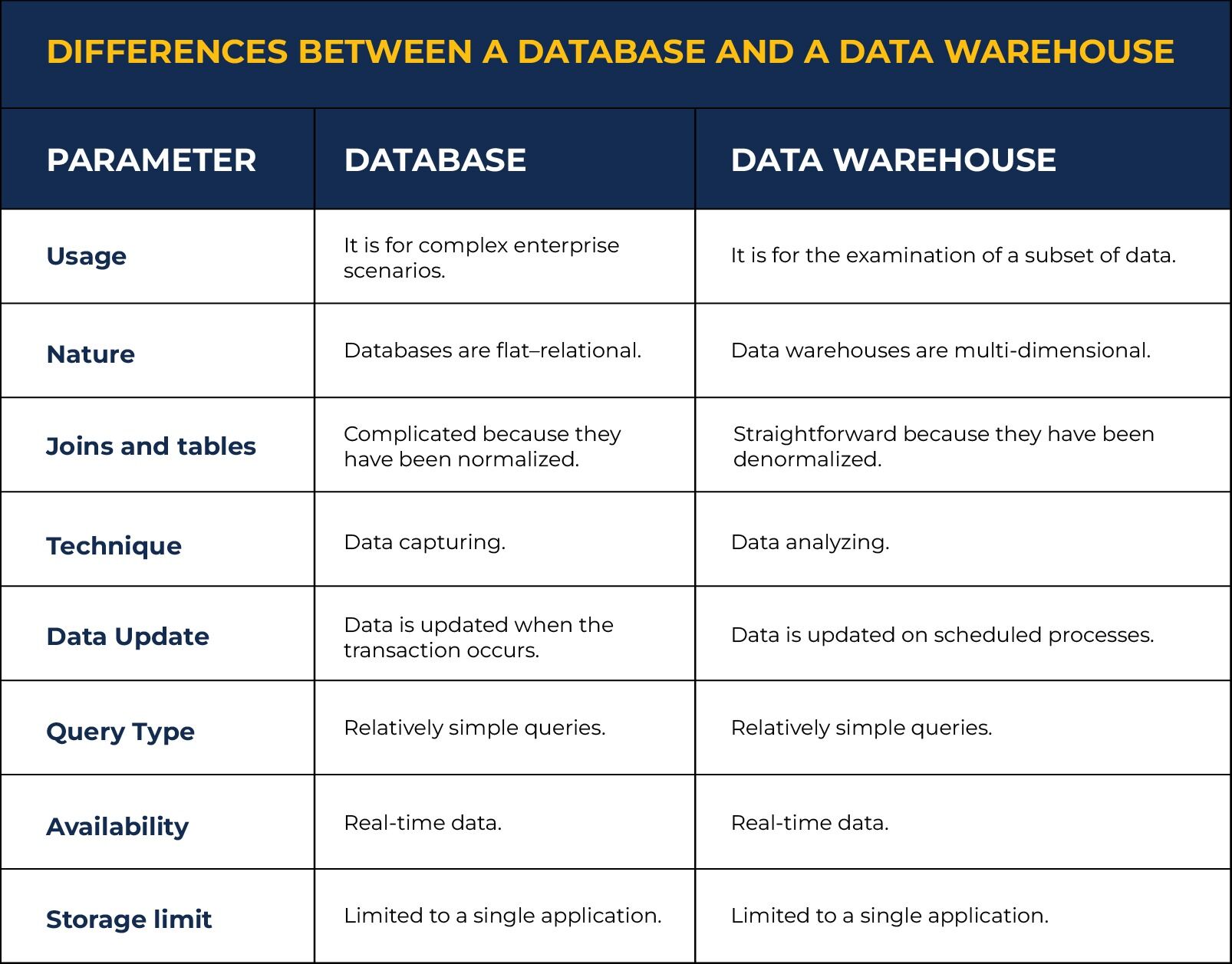
Database systems are employed conventionally for data storage and retrieval purposes. Processing queries is a database system’s primary responsibility. “Online transaction processing systems” is the general term used to describe these systems.
On the other hand, data warehousing is intended for viewers or knowledge employees who make decisions using data.
These systems are designed to arrange and display data in various formats and forms according to the individual user’s requirements for a given purpose. We call these systems “online analytical processing systems.”
What is a Database?
A database is the traditional way of storing and retrieving data. It stores real-time information for quick use of a particular aspect of a business. A database’s primary task is performing query processing, daily transactions, and other regular operations.
Databases are essential for storing information that can be retrieved when needed. They aim to provide immediate access to data to a wide range of users.
What is a Data Warehouse?
A data warehouse stores data from many different sources within an organization. Unlike databases, data warehouses have analytical capabilities. They are connected with business intelligence tools for detailed analysis.
Data warehouses organize data in different forms to help make business decisions. They allow you to make insights from historical data about your business. Data warehouses do not store current information, nor are they updated in real-time.
Differences Between a Database and a Data Warehouse
Benefits of Data Warehousing
Here are some essential reasons why you should choose a data warehouse.
- Business users can access crucial data in a data warehouse through different sources. Various cross-functional domains offer data, and the warehouse helps you combine data from many sources to lessen the strain on the manufacturing systems.
- You can use the help of a data warehouse to reduce the total time for analyzing and submitting reports. Users can access data from different sources in one location rather than accessing it from other individual sources in data warehouses.
- Cloud data is straightforward to access. A lot of historical data can be kept in a data warehouse to study various timeframes and trends to anticipate the future. It increases the value of your customer relationship management systems and operational business applications.
- To enhance the performance of both systems, a data warehouse creates a barrier between the processing of analytics and the transactional database. The users and stakeholders may doubt and underestimate the quality of the data in the source system. However, the reports of the data warehouse have more accuracy.
Data Warehouse Examples
Data warehouses are primarily used in cases that require detailed analysis of an organization’s past, present, and future.
Here are some of the well-known examples of data warehouses:
- Microsoft Azure Synapse
- Amazon Redshift
- Snowflake
- IBM Db2 Warehouse
- Google BigQuery
- Oracle Autonomous Data Warehouse
Challenges of using Data Warehousing
The procedure for incorporating new data sources is time-consuming and expensive. Data warehousing requires a lot of maintenance. Data extraction, loading, and cleansing may take a while.
Using a data warehouse may appear straightforward initially, but it is too complex for most people. End users who don’t use a data warehouse or have never mined data must be adequately trained first.
Despite the challenges associated with data warehousing, it is expected to grow in scope in the coming years.
Characteristics of Data Warehousing
Large amounts of recent and old data from diverse sources are kept in data warehouses. They include a variety of data, including highly curated, cleaned, sorted, and aggregated data, as well as raw ingested data.
Data is transferred from its source to the data warehouse using the extract, transform, and load (ETL) procedures. The data in a data warehouse might not always reflect the most recent status of the systems because the ETL operations regularly shift data (e.g., hourly or daily).
Typically, data warehousing has a set and predefined relational schema. Because of this, they function well with organized data.
Benefits of a Database
The following are the main reasons why companies use databases:

Database Examples
Databases come in many different sizes and forms. That is why there are different types of databases, such as:
- Relational databases like Oracle and MySQL
- Document databases like MongoDB and CouchDB
- Key-value databases like Redis and DynamoDB
- Graph Database like Neo4j and Amazon Neptune
Challenges of Using a Database
Implementing a database system requires expensive hardware and software, which increases an organization’s IT budget. Since many DBMS are complicated systems, users must also receive proper training before using the DBMS.
A DBMS is unable to carry out complex calculations. It also creates problems relating to incompatibility with existing systems. Data owners may no longer have control over it, which raises concerns about ownership, security, and privacy.
Characteristics of Databases
Over the past few decades, numerous kinds of databases have emerged. Although all database views hold information, each database has unique traits. Data is stored in tables with fixed rows and columns in relational databases.
Key value pairs, tables with columns and rows, edges and nodes, and JSON (JavaScript Object Notation) are just a few of the models you can use to store data in non-relational databases (sometimes referred to as NoSQL databases).
Depending on the type, databases may store semi-structured or structured data.
Final Thoughts! The Database or Data Warehouse: Which one is Better?
After discussing the salient features of data warehouses and databases, one can conclude that a data warehouse helps the company examine its historical records, while a database helps the organization do its essential operations.
Depending on their business needs, companies pick one of these. Each includes capabilities that aid in commercial effectiveness or the capacity to comprehend user demands. Each has unique qualities that assist businesses in overcoming challenges by utilizing both solutions.
To sum it up, a database supports the core business processes, whereas a data warehouse supports business analysis. You should choose the option that best meets your business goals.
Contact us at [email protected] to learn how Xavor can help you build a database management system or a data warehouse tailored to your needs.

